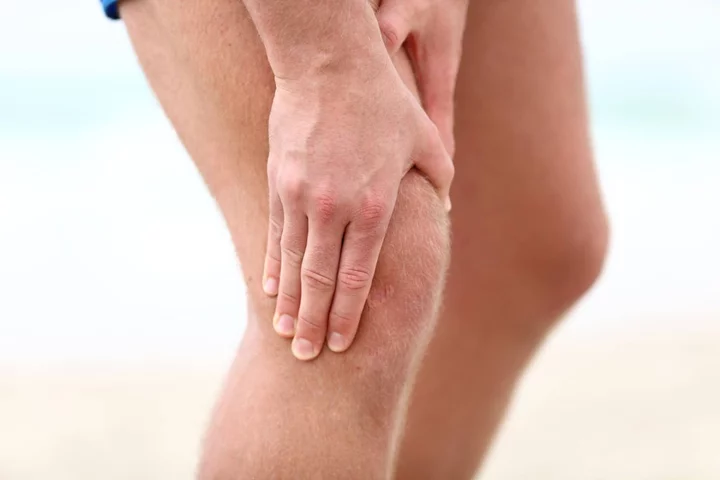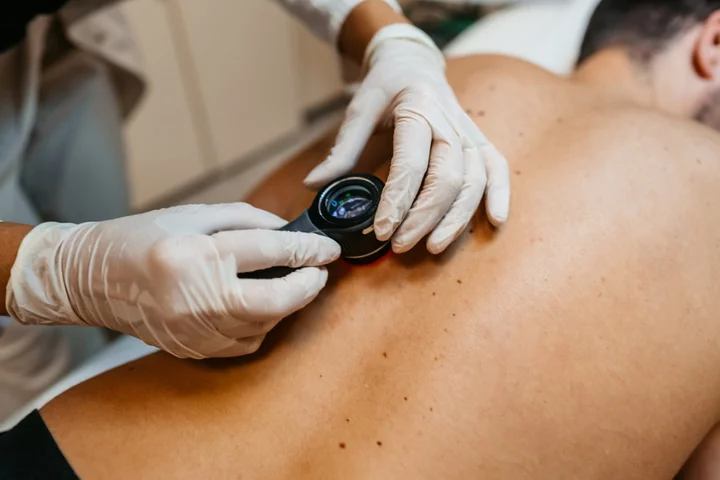
Pennsylvania police broadcast message from escaped murderer's mother encouraging him to surrender
Pennsylvania police are broadcasting a message from escaped murderer Danelo Cavalcante's mother urging him to surrender, as authorities narrow in on a 2-mile area where they believe he is hiding.
1970-01-01 08:00

Adam Thomas ‘struggling’ and in ‘pain’ with rheumatoid arthritis ahead of Strictly Come Dancing debut
Adam Thomas has admitted that he’s “struggling” and in “pain” after being diagnosed with rheumatoid arthritis ahead of his appearance on Strictly Come Dancing. The Waterloo Road star is one of the 15 celebrities preparing to put themselves to the test as they compete on the 21st series of dance competition series Strictly. Just days after it was announced that he had joined the cast, Thomas shared on his 35th birthday that he had recently been diagnosed with rheumatoid arthritis. An autoimmune disease, rheumatoid arthritis is a long-term condition that causes pain, swelling and stiffness in the joints. It usually affects the hands, feet and wrists and can cause flare-up periods where symptoms become worse for a period of time. On Sunday (3 September), the former Coronation Street star posted a shirtless selfie to Instagram following a swimming session. Writing in the caption, Thomas said that he was posting the image “to get comfortable feeling uncomfortable”. “Am not in the best shape of my life, but I could be worse,” he wrote. “This year has been tough there’s no doubt about that… but I’ve just got to stay focused now! I’m still struggling and the pain is still there but I’m putting on a brave face I’ve got to stay strong [sic]!” Thomas continued: “Swimming helps me so much with my arthritis, I mean as much as it kills me getting my top off and going for a swim, I know it’s helping me and I know it’s also helping me deal with the issues I’ve got with me and my body. Which is a good thing!” “Got a feeling am going to get a lot more out of the next few months than I bargained for [sic]! Let’s go!” Thomas announced that he had been diagnosed with rheumatoid arthritis last month, explaining that he had “been in a lot of pain since January”. “It started with my knees and then travelled to my wrists, fingers and now ankles and toes,” he wrote. “I never knew what was happening and finally after several blood tests and back and forth to doctors and hospitals, I’ve been diagnosed with rheumatoid Arthritis!” The actor had originally said that he signed up for Strictly – which begins later this month – in order “to be able to move again, get fit and do it, all with a smile on my face”. Strictly Come Dancing returns in September on BBC One. Read More Kanye West and ‘wife’ Bianca Censori banned from Venice boat company after ‘obscenities’ on board Yellowstone season 5: Kevin Costner finally explains why he quit the show Fyre Fest 2.0? Chris Rock and Diplo escape Burning Man festival as 70,000 stranded in desert How to look after your joints, as women experience ‘significantly higher’ pain than men How can parents and children battle back-to-school anxiety? Khloe Kardashian officially changes son Tatum’s last name
1970-01-01 08:00

Hong Kong media guide
An overview of the media in Hong Kong, as well as links to broadcasters and newspapers.
1970-01-01 08:00

How to look after your joints, as women experience ‘significantly higher’ pain than men
Joint pain can have a “significantly higher” physical and emotional impact on women compared to men, according to new data. Almost half (44%) of women in the survey who reported joint pain said it affected their emotional wellbeing, compared to 34% of men; while 47% of women said it impacted their sleep, and 37% of men. Nuffield Health surveyed 8,000 people over the age of 16 as part of its Healthier Nation Index. In general, Nuffield Health found 80% of women have suffered from past or current joint pain, whilst 77% of men have experienced the same. Marc Holl, head of primary care at Nuffield Health, said: “Joint pain has been ignored for far too long, and our data shows the shocking extent to which it is impacting the nation. “It affects everything: working, sleeping, walking, exercising and even resting. When we look at the worrying numbers of people, and particularly women, such things are only going to get worse.” Here’s what you need to know about looking after your joints… What misconceptions do people have about their joints? People often think that if they have a bad back or bad knees, they should avoid exercise. “This then leads people to do less over time, so the only stimulation their muscles get is an ever-decreasing level of daily activity,” said Michael Fatica, consultant osteopath from interactive online rehabilitation programme, Back In Shape. “So the joints become more vulnerable and painful. But joints are strong and, although there might well be an injury or degeneration which requires short-term modification, there should always be a pathway to medium to long-term strengthening.” How should you look after your joints? “Participate in regular strength or resistance training with a full range of motion,” Fatica suggested. “This helps you rebuild the lost strength in the muscles that protect and move the joint. Additional flexibility work can be done to ensure normal joint mobility too.” Modern life doesn’t always allow for a full range of motion movements, particularly in the knees, hips, and ankles. Unfortunately, this might allow weakness and degeneration to take place. “It is a lack of full movement and stimulation of these joints that leads to damage,” Fatica said. “People make the mistake of thinking regular walking or running should keep them healthy, but these movements for example do not involve full range of motion in the hips knees and ankles.” What exercises can people do? It can be difficult to know what type of exercise actually helps with joint pain, rather than aggravating it. Fatica said: “The squat is the simplest and most easily accessible exercise and can be scaled with resistance – you must develop good form otherwise you will injure yourself. Three to five rounds of 10 reps is a great starting point.” Why might women experience “significantly higher” pain than men? In addition to the findings Nuffield Health has already made, Fatica added: “I think that particularly in the load-bearing joints, women are less likely to partake in the type of exercises mentioned above, although this is changing in younger generations.” He suggested women might be “a little more cautious about partaking in such activities” and have a “fear of becoming ‘bulky'”, which could lead to “inadequate muscle health and strength”. Read More Charity boss speaks out over ‘traumatic’ encounter with royal aide Ukraine war’s heaviest fight rages in east - follow live Can you grow a lemon tree from a pip? The beginner gardening questions we all want to ask Fraser Franks undergoing heart surgery – four years after ‘hidden’ condition cut short football career 4 viral TikTok make-up trends you’ll actually want to try
1970-01-01 08:00

Edinburgh Zoo's giant pandas to return to China in December
The loan agreement which brought Tian Tian and Yang Guang to Edinburgh Zoo is finally ending.
1970-01-01 08:00

Metallica reschedule Glendale gig after James Hetfield tested positive for COVID-19
Metallica will now play State Farm Stadium on Saturday, September 9.
1970-01-01 08:00

How can parents and children battle back-to-school anxiety?
With schools opening their doors again on Monday, both parents and their children could be experiencing a mixture of emotions, including anxiety. Usually during the summer holidays, bedtime routines go out the window, diets may change and day-to-day activities are usually packed with plenty of fun activities. So trying to recalibrate and get back to regular programming isn’t always straight forward, after six weeks away. Here’s how parents and children can beat back-to-school anxiety… What is anxiety? According to the NHS website, anxiety is a feeling of stress, panic or fear that can affect your everyday life physically and psychologically. Why do parents and children battle with back-to-school anxiety? Jade McLellan, deputy head of pastoral at St Dunstan’s College believes anxiety is a feeling of worry or fear, that for most people, can be momentary, mild or manageable. But for others, it can be constant, overwhelming or debilitating.“Whether there have been holidays in the UK or abroad, or complicated childcare arrangements to navigate while parents continue working, the chances are that your child has had to adapt to a different regime over the holidays and the thought of early starts and late finishes at school can seem daunting. “Schools can be overwhelming environments: noisy, bright, busy and exhausting. If your child has spent the summer in a small family unit, returning to be one of 500 or 1,500 children comes as a shock to the system,” McLellan said.“For some children, particularly neurodiverse children, any form of change can induce anxiety, so the transition into the summer holidays and the transition back to school can both cause anxiety. “On the parent-side, the intense organisation required to manage the school routine, with fitting in pick-up and drop-off around work, remembering letters, trips, non-uniform days and navigating tired children with homework deadlines can all cause parents to feel anxious.”What signs should parents look out for when it comes to anxiety? There are a wide number of signs of anxiety. “Signs of anxiety can be demonstrated in a number of ways, such as complaining of a bad tummy or an illness that isn’t really there, behavioural changes or tantrums, saying no to everything, loss of appetite and lots of tears for no reason,” said parenting expert Amanda Jenner. McLellan adds: “Some are obvious, such as biting nails, becoming quiet, or struggling to sleep or eat. However, anxious children can also lash out and become angry, withdraw socially, suffer from unexplained stomach aches or headaches, or even experience panic attacks.”How can parents battle back-to-school anxiety? Ryan Lockett, a former secondary school head of year and now director of studies at TLC LIVE, a tutoring company for schools, believes it all starts with practising good organisational skills. “Walk to the school. It can ease anxiety if they remind themselves of the surroundings. Less traffic and fewer people will help them feel calmer about the journey,” he said. “Start talking about school, in a positive way. Encouragement and positivity will help a child to feel a sense of excitement and look forward to returning. “Discuss any fears or worries they have and try to address them before the return. It may well be as simple as needing a new pencil case because they’re worried about an equipment check on the first day back; it’s an easy one to solve,” he adds. “Make sure any homework or summer tasks have been completed ahead of time. Don’t let this wait until the week before returning. Get it done in good time; it will help reduce anxiety related to incomplete work.” How can children battle back-to-school anxiety? Life coach, educator and therapist Danielle Baron thinks it’s essential for children to equip themselves with the right tools to tackle back-to-school anxiety. “Expressing yourself creatively can be a therapeutic way to cope with anxiety,” Baron said. “Whether it’s journaling, painting, playing a musical instrument, or writing poetry, find an artistic outlet that helps you channel your emotions and thoughts in a positive way.”She adds: “It’s okay to ask for help when you’re feeling anxious. Talk to your parents, teachers, a trusted person or school counsellor about your worries. They can offer guidance, support and resources to help you manage anxiety effectively. “Remember that everyone goes through changes, and it’s okay to feel a mix of emotions; it’s only human. But it is our ability to bounce back quickly that counts.” Are there any resources parents and children can use?There are different online resources children and parents can use, if they need extra support. SilverCloud offer a range of digital CBT programmes for anxious teens. These NICE-approved programmes are free and accessible. Read More Charity boss speaks out over ‘traumatic’ encounter with royal aide Ukraine war’s heaviest fight rages in east - follow live Can you grow a lemon tree from a pip? The beginner gardening questions we all want to ask Fraser Franks undergoing heart surgery – four years after ‘hidden’ condition cut short football career 4 viral TikTok make-up trends you’ll actually want to try
1970-01-01 08:00

'It doesn't feel right': Amanda Seyfried rules herself out of promoting indie movie amid Hollywood Strikes
Amanda Seyfried has ruled herself out from appearing at the Toronto International Film Festival to promote 'Seven Veils'.
1970-01-01 08:00

Roads out of Burning Man may reopen Monday for the tens of thousands of people still trapped there after rain deluged the area with mud
Roads out of the Burning Man festival may reopen Monday for the tens of thousands of people trapped for a third day in the Nevada desert after heavy rains covered the grounds with ankle-deep mud too thick to drive on and forced organizers to impose shelter-in-place orders.
1970-01-01 08:00

Rodgers was Right: Randall Cobb hit with hefty fine for blindside block
New York Jets wide receiver Randall Cobb was fined $13,889 for his blindside block on New York Jets defensive back Bobby McCain in the preseason.
1970-01-01 08:00

What is Merkel cell skin cancer? The signs and symptoms of the rare condition
Jimmy Buffett died aged 76 on Friday (1 September), in hospice care, after a years-long private struggle with skin cancer. In a statement shared on his website, it was announced that the singer, who was best known for his hit song “Margaritaville”, had been fighting Merkel cell skin cancer for four years. Cancer Research UK has recently warned that skin cancer cases are set to rise by half by 2040, with rocketing diagnoses driven by the “cheap package holiday” boom of the 1960s. Skin cancer is the most common form of cancer in Britain and kills around 2,100 people each year. It is also one of the most common cancers in the world. What is Merkel cell skin cancer? Merkel cell carcinoma (MCC) is a rare type of skin cancer. According to Cancer Research UK, it starts in the Merkel cells, which are usually in the top layer of the skin. These cells are near the nerve endings and they help us respond to touch. The charity states that MCC is a “very rare” form of skin cancer, with 1,500 people diagnosed with the condition in England between 1999 and 2008. What are the causes of Merkel cell carcinoma? With most types of skin cancer, long-term exposure to sunlight can increase a person’s risk of getting MCC. Other factors that could increase a person’s risk include being exposed to ultraviolet light, having a condition that can weaken your immune system or having a virus called Merkel cell polyomavirus (MCPyV). What are the symptoms? MCC usually appears as lumps on the skin. According to Cancer Research UK, the lumps are often a blue/red colour and less than 2cm across but sometimes they can be larger. The skin over them is usually firm and they are not painful. These lumps are often found on the areas of the body that get the most direct sun, such as the head, neck, arms or legs. Unlike most common types of skin cancer, MCC can develop rapidly over weeks or months and can spread to other parts of the body such as the lungs, lymph nodes, liver or bones. The NHS advises that if you are in doubt, contact your GP. How to prevent developing skin cancer Skin cancer is not always preventable, but you can reduce your chance of developing it by avoiding overexposure to UV light. You can protect yourself from sunburn by using high-factor sunscreen, covering up your skin while in the sun, and limiting the amount of time you spend in the sun during the hottest part of the day. Sunbeds and sunlamps should also be avoided. Read More Pregnant Kourtney Kardashian and Travis Barker seen leaving hospital after ‘urgent family matter’ Woman adopts husband’s ex-wife’s baby after growing up in foster care herself ‘People looked at me like I was oppressed in some way’: Young Christians on life in secular Britain How to check if you have skin cancer: Symptoms and signs to look out How many times a week you need to workout to get fit Post Malone shows off 55-pound weight loss in new photos after giving up soda
1970-01-01 08:00

Burning Man attendees are still stranded in ankle-deep mud after heavy rains force road closures in the Nevada desert
Tens of thousands of people still can't leave the Burning Man festival in the Nevada desert after heavy rains inundated their campsites with ankle-deep mud Saturday -- and more showers are on the way.
1970-01-01 08:00
